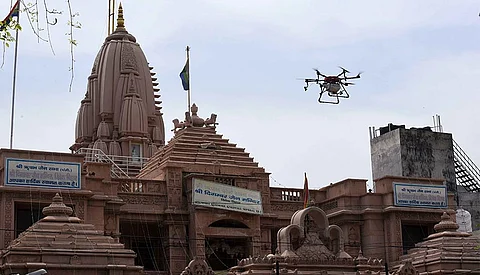
🔧 We’re Under Maintenance
We’ll be back shortly. Thank you for your patience.
We’ll be back shortly. Thank you for your patience.

Necessity has been the mother of invention in the response to the COVID-19 pandemic, and nowhere is this more apparent than in India. With a clear focus on affordability and low cost, here is how frugal Indian innovations have taken the commercial route to aid the fight against the pandemic.
With a majority of these innovations being spearheaded by Indian Institutes of Technology (IITs) across the country, it's also a vote of confidence on the robust culture of practical innovation that has always given the Indian economy an extra edge.
From sanitisation drones, digital stethoscopes and infection-proof fabric for hospitals to incredibly cheap portable ventilators and affordable Covid-19 test kits, the swift innovation at the heart of India's response to the coronavirus pandemic has been a testimony to its age-old tradition of being creative and resourceful in the face of social crisis and resource constraints. With a majority of these innovations being spearheaded by Indian Institutes of Technology (IITs) across the country, it's also a vote of confidence on the robust culture of practical innovation that has always given the Indian economy an extra edge. The key innovations during this period have taken the commercial route either through IIT-incubated startups or the institutes have awarded licenses to companies and kept the patent rights with themselves.
In the case of India frugal innovation has not only serving the needs of the most underserved segments of the society but has also made its businesses globally competitive and paved the way for sustainable development in several scenarios.
Before we dove deep into the amazing array of products that Indian scientists and entrepreneurs have created in the short span of the past four months, let's take a moment to understand what is it that makes India a frontrunner for an innovation paradigm with increasing global relevance during the coronavirus pandemic Why do Indians have a general knack for frugal solutions
“On one hand, there are concrete economic factors that give rise to resource-efficient and affordable solutions to problems faced in day-to-day life in India. On the other hand, frugality has been long regarded as a virtuous social value in India and the socio-cultural context of the country provides a fertile environment for the acceptance of frugal products and services on both demand and supply sides,” said Rajnish Tiwari, Professor at the Centre for Frugal Innovation in Hamburg's University of Technology. While this has been the reality for many countries with a low income GDP - which is one reason why so many frugal innovations emerge from these contexts - in the case of India frugal innovation has not only serving the needs of the most underserved segments of the society but has also made its businesses globally competitive and paved the way for sustainable development in several scenarios.
Consider the case of the $6 Covid-19 test kit.
Yes, you read that right - and that's a product developed by scientists, professors and research students of IIT Delhi, which became the first academic institute to get an approval from the Indian Council for Medical Research (ICMR) for the Covid-19 test kit. The institute has given a non-exclusive open licence to Bengaluru-based biotechnology firm Genie Laboratories for commercial roll out of the test, but with a price rider of Rs500 (around $6) per kit. The kits are being manufactured at the Andhra Pradesh MedTech Zone (AMTZ) in Vishakhapatnam.
“More than 40 companies, including a few big names, have reached out to us to commercialise the test. We will be giving open licences to companies which meet the quality criterion set by us and set a price rider so that companies do not hike the price once commercialised. We have chosen Genie laboratories as the first one, but there will be more companies too,” IIT Delhi Director V Ramgopal told the PTI news agency last month.
So how could the test come at a throwaway price when most other countries are finding it hard to bring the price of test-kits down below even $50 According to the IIT Delhi team, the current testing methods available in the market are “probe-based” while the one developed by the IIT team is a “probe-free” method, which immediately reduces the testing cost without compromising on the accuracy of results.